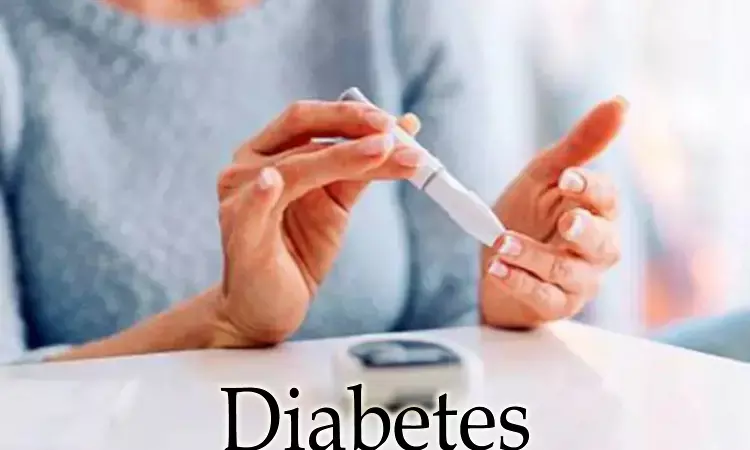- Home
- Medical news & Guidelines
- Anesthesiology
- Cardiology and CTVS
- Critical Care
- Dentistry
- Dermatology
- Diabetes and Endocrinology
- ENT
- Gastroenterology
- Medicine
- Nephrology
- Neurology
- Obstretics-Gynaecology
- Oncology
- Ophthalmology
- Orthopaedics
- Pediatrics-Neonatology
- Psychiatry
- Pulmonology
- Radiology
- Surgery
- Urology
- Laboratory Medicine
- Diet
- Nursing
- Paramedical
- Physiotherapy
- Health news
- Fact Check
- Bone Health Fact Check
- Brain Health Fact Check
- Cancer Related Fact Check
- Child Care Fact Check
- Dental and oral health fact check
- Diabetes and metabolic health fact check
- Diet and Nutrition Fact Check
- Eye and ENT Care Fact Check
- Fitness fact check
- Gut health fact check
- Heart health fact check
- Kidney health fact check
- Medical education fact check
- Men's health fact check
- Respiratory fact check
- Skin and hair care fact check
- Vaccine and Immunization fact check
- Women's health fact check
- AYUSH
- State News
- Andaman and Nicobar Islands
- Andhra Pradesh
- Arunachal Pradesh
- Assam
- Bihar
- Chandigarh
- Chattisgarh
- Dadra and Nagar Haveli
- Daman and Diu
- Delhi
- Goa
- Gujarat
- Haryana
- Himachal Pradesh
- Jammu & Kashmir
- Jharkhand
- Karnataka
- Kerala
- Ladakh
- Lakshadweep
- Madhya Pradesh
- Maharashtra
- Manipur
- Meghalaya
- Mizoram
- Nagaland
- Odisha
- Puducherry
- Punjab
- Rajasthan
- Sikkim
- Tamil Nadu
- Telangana
- Tripura
- Uttar Pradesh
- Uttrakhand
- West Bengal
- Medical Education
- Industry
Longer diabetes duration increases risk for Frozen shoulder, independent of diabetes type

Frozen shoulder (FS) is a disabling and sometimes severely painful shoulder condition that is commonly managed in a primary care setting. Patients with diabetes mellitus (DM) have a high risk of developing pain or other symptoms from their shoulders.
Literature states that early diagnosis of diabetes mellitus may reduce the risk of long-term chronic disability of the shoulder as well as other complications. However, recently a report mentioned that there are different associations of frozen shoulder with gender and that haemoglobin A1C were observed for type 1 (T1D) or type 2 (T2D) diabetes, according to the study published in the Experimental and Clinical Endocrinology & Diabetes.
Alexander J. Eckert and colleagues from the Institute of Epidemiology and Medical Biometry, University of Ulm, Ulm, Germany examined the association of frozen shoulder (FS) with demographic and diabetes-related outcomes in individuals with type 1 (T1D) or type 2 (T2D) diabetes aged ≥30 years.
Multivariable logistic regression models, adjusted for demographics were used to calculate the proportion of FS in association with age, gender, diabetes duration, body mass index (BMI), haemoglobin A1C (HbA1c) and diabetes treatment.
The following findings were observed-
a. The unadjusted percentage of frozen shoulder was higher in T1D compared to T2D (0.22% vs. 0.06%).
b. In T1D, adjusted regression models revealed higher prevalence of frozen shoulder in women than men (0.26 [0.20–0.34] % vs. 0.15 [0.11–0.21] %, p=0.010).
c. No significant relationship of age and BMI with frozen shoulder was found in both diabetes types.
d. Longer diabetes duration was associated with a higher proportion of frozen shoulder in T1D (p<0.001) and T2D (p=0.004).
e. In T1D, HbA1c >7% was related to a higher proportion of frozen shoulder compared to HbA1c ≤7%, while an inverse relationship was found in T2D.
Therefore, it was concluded that different associations of frozen shoulder with gender and haemoglobin A1C were observed for T1D and T2D; however, longer diabetes duration increases the risk for frozen shoulder independent of diabetes type.
Musculoskeletal diseases are still underreported in individuals with diabetes and awareness should be raised for frozen shoulder as a specific diabetes complication, they further added.
DOI: 10.1055/a-1543-8559
Dr. Nandita Mohan is a practicing pediatric dentist with more than 5 years of clinical work experience. Along with this, she is equally interested in keeping herself up to date about the latest developments in the field of medicine and dentistry which is the driving force for her to be in association with Medical Dialogues. She also has her name attached with many publications; both national and international. She has pursued her BDS from Rajiv Gandhi University of Health Sciences, Bangalore and later went to enter her dream specialty (MDS) in the Department of Pedodontics and Preventive Dentistry from Pt. B.D. Sharma University of Health Sciences. Through all the years of experience, her core interest in learning something new has never stopped. She can be contacted at editorial@medicaldialogues.in. Contact no. 011-43720751
Dr Kamal Kant Kohli-MBBS, DTCD- a chest specialist with more than 30 years of practice and a flair for writing clinical articles, Dr Kamal Kant Kohli joined Medical Dialogues as a Chief Editor of Medical News. Besides writing articles, as an editor, he proofreads and verifies all the medical content published on Medical Dialogues including those coming from journals, studies,medical conferences,guidelines etc. Email: drkohli@medicaldialogues.in. Contact no. 011-43720751


